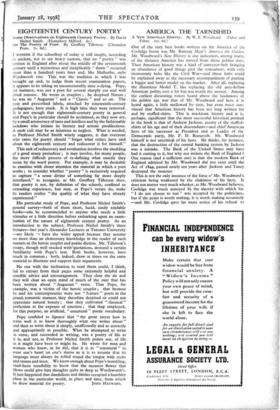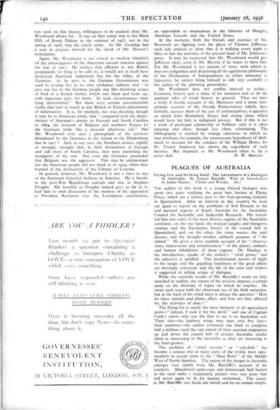AMERICA THE TARNISHED
A New American History. By W. E. V'oodward. (Faber and Faber. I2s. 6d.) ONE of the very best books written on the America of the Coolidge boom was Mr. Ramsay Muir's America the Golden. Mr. Woodward's New History is one indication, among many, of the distance America has moved from those golden days. Then American history was a kind of conveyor-belt bringing an abundance of good things past the consumers, with only momentary halts like the Civil War—and those halts could be explained away as the necessary accompaniment of putting a bigger and better model on the market. After all, replacing the illustrious Model T, like replacing the old ante-bellum American polity, cost a lot but was worth the money. Among the earliest dissenting voices heard above the laudations of the golden age was that of Mr. Woodward and here it is heard again, a little mellowed by time, but even more con- vinced that American history has been too long written for and by stuffed-shirts. This is mackinaw history and it is, perhaps, significant that the most successful historical portrait in the book is that of Andrew Jackson, enemy of the stuffed- shirts of his age and of their descendants—and chief American hero of his successor as President and as Leader of the Democratic party, Mr. F. D. Roosevelt. Mr. Woodward himself is not uncritical of his hero. He thinks, for instance, that the destruction of the central banking system by Jackson was a mistake. The Bank of the United States may have had it coming to it, but why not imitate the Bank of England ? One reason (and a sufficient one) is that the modern Bank of England admired by Mr. Woodward did not exist until the Act of 1844, passed nearly ten years after Jackson and Taney destroyed the monster.
This is not the only instance of the force o' Mr. Woodward's criticism being weakened by the shakiness of his facts. It does not matter very much whether, as Mr. Woodward believes, Coolidge was much annoyed by the alacrity with which his " I do not choose to run " was accepted by the politicians, but if the point is worth making, it is worth making accurately —and Mr. Coolidge gave far more notice of his refusal to
run (and, on this theory, willingness to be pushed) than Mr. Woodward allows for. It was on that comic trip to the: Black Hills of South Dakota in the summer of 1927, not in the- spring of 1928, that the oracle spoke. So Mr. Coolidge had a year to prepare himself for the shock of Mr. Hobver's nomination.
Again, Mr. Woodward is too critical to swallow blindfold all the extravagances of the American current reaction against. the war of 1917. He realises that efficient as was British
propaganda (or lying as he calls it), it would not in itself have destroyed American judgement but, for the follies of the Germans. As he puts it, the German Government was. used to issuing lies to its own credulous subjects and " to ' pass out lies to the German people was like throwing scraps of food to a Scotch terrier, which eats them and looks up,' with expectant eyes, for more. In such circumstances their lying deteriorated." But there were certain uncomfortable truths that hurt as much as any British or French adjustments of information. It is, for example, not true, shocking though it may be to American pride, that " compared with the depre- dations of Sherman's armies in Georgia and South Carolina in 1864, the invasion of Belgium and northern France by the Germans looks like a pleasant afternoon call." Has Mr. Woodward - ever seen a photograph of the territory abandoned by the Germans in the retreat to the Hindenburg line in 1917 ? And, in any case, the Northern armies, rightly or wrongly, thought that, in their devastation of Georgia and still more of South Carolina, they were punishing the instigators of the war. Not even the Germans pretended that Belgium was the aggressor. This may be unimportant but the American people did not think so in 5914, when they learned of the destruction of the Library of Louvain.
In general, however, Mr. Woodward is not a slave to any of the dominant historical fashions in America. He is hostile to the post-War Republican radicals and also to Stephen' Douglas. His hostility to Douglas indeed goes so far as to ' lead him to omit discussion of the motives of his opposition' to President Buchanan over the Lecompton constitution,
an -opposition so- momentous in .the -histories of Douglas, Abraham Lincoln and the United States.
At the moment, both the friends and enemies of Mr. Roosevelt are fighting over the ghost of Thomas Jefferson, each side 'anxious to show that it- walking every night to bless or ban the activities of the present head of Mr. Jefferson's party. It may. be suspected that Mr. Woodward would give Jefferson away, even to Mr. Hoover if he, wants to have hint For Mr. Woodward is not patient of views with which he does not sympathise and, dismissing all the egalitarian philosophy of the Declaration of Independence as, either nonsense or hypocrisy, he cannot bring himself to talk very cordially of the author of the glittering generalities.
Mr. Woodward does not confine _ himself to politic3. Economic history gets a share of his attention and so do the quainter sides of social history in general. Thus we have a lively if hostile account of the Mormons and a more sym- pathetic account of the Oneida Perfectionists which, inci- dentally, accuses them of the use of contraceptives, a question on which John HumphreY Noyes had strong views which would have led him to indignant protest. But if this is not a work of profound scholarship or brilliant style it is often amusing and often, though less often, stimulating. The bibliography is marked by strange omissions to which we may attribute, for example, the unnecessary hypothesis of shell- shock to account for the conduct of Sir William Howe, for Dr. Troyer Anderson has shown the superfluity of such theories. But dogmatic as Mr. Woodward often is, he is



















































 Previous page
Previous page